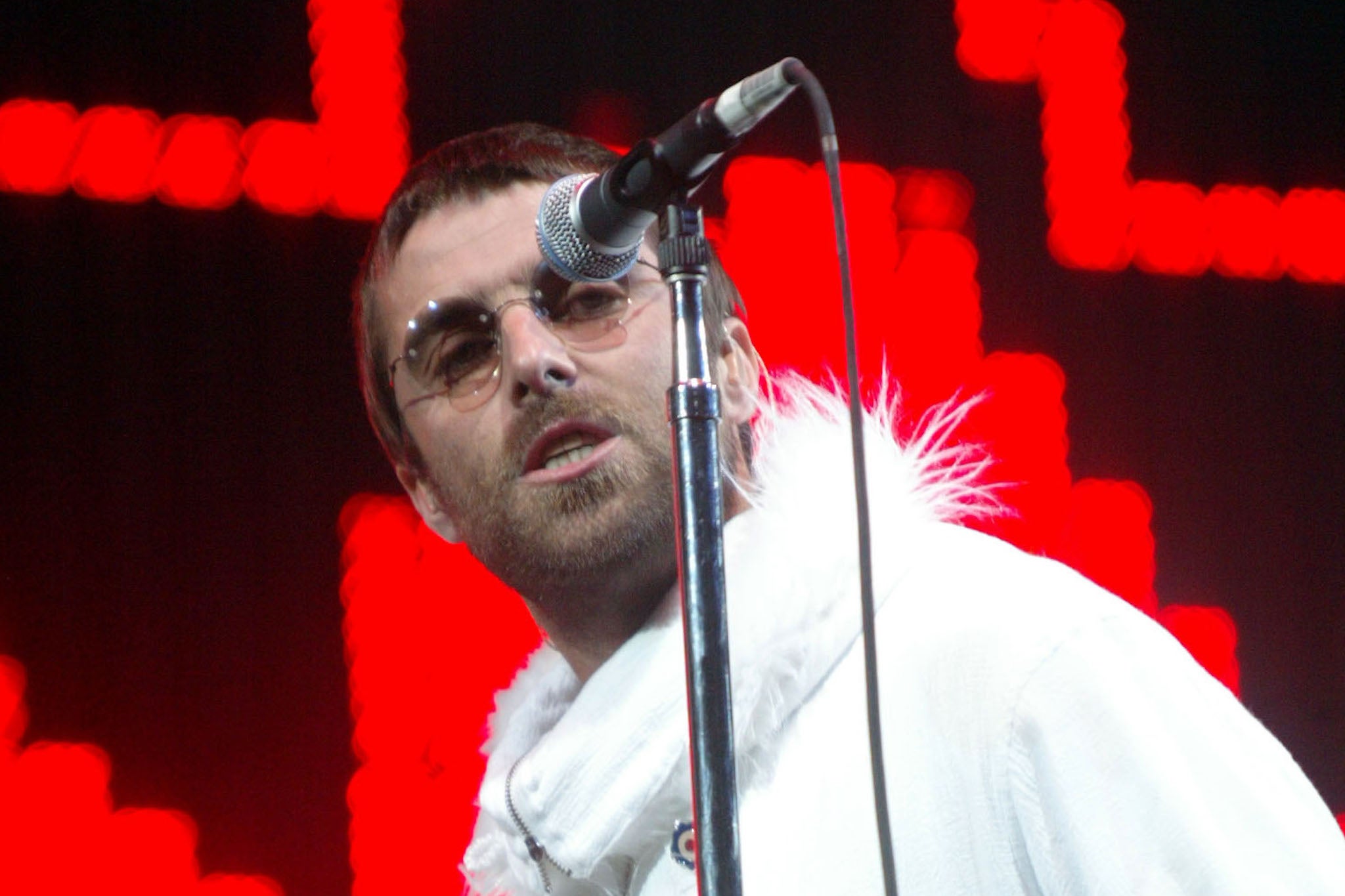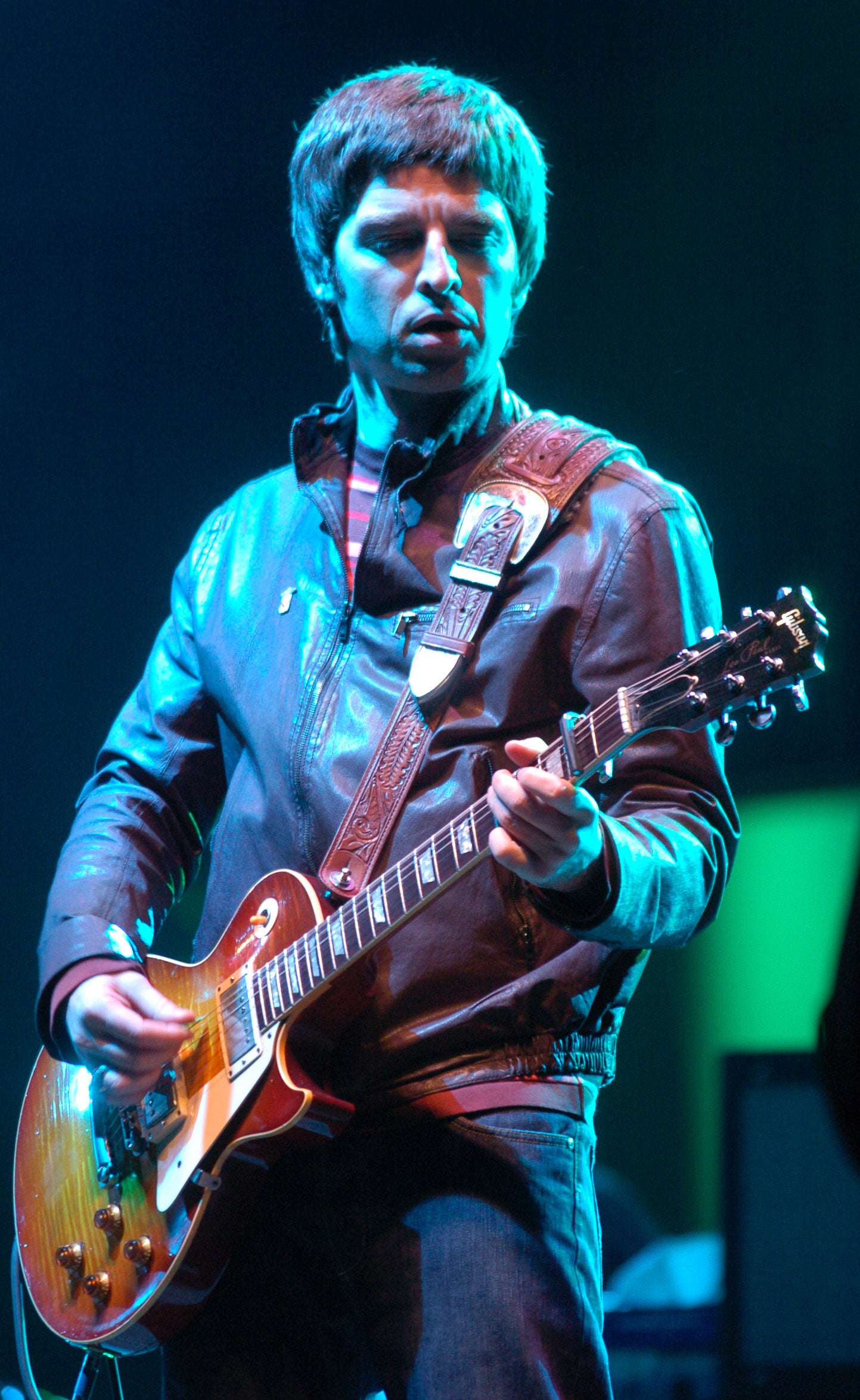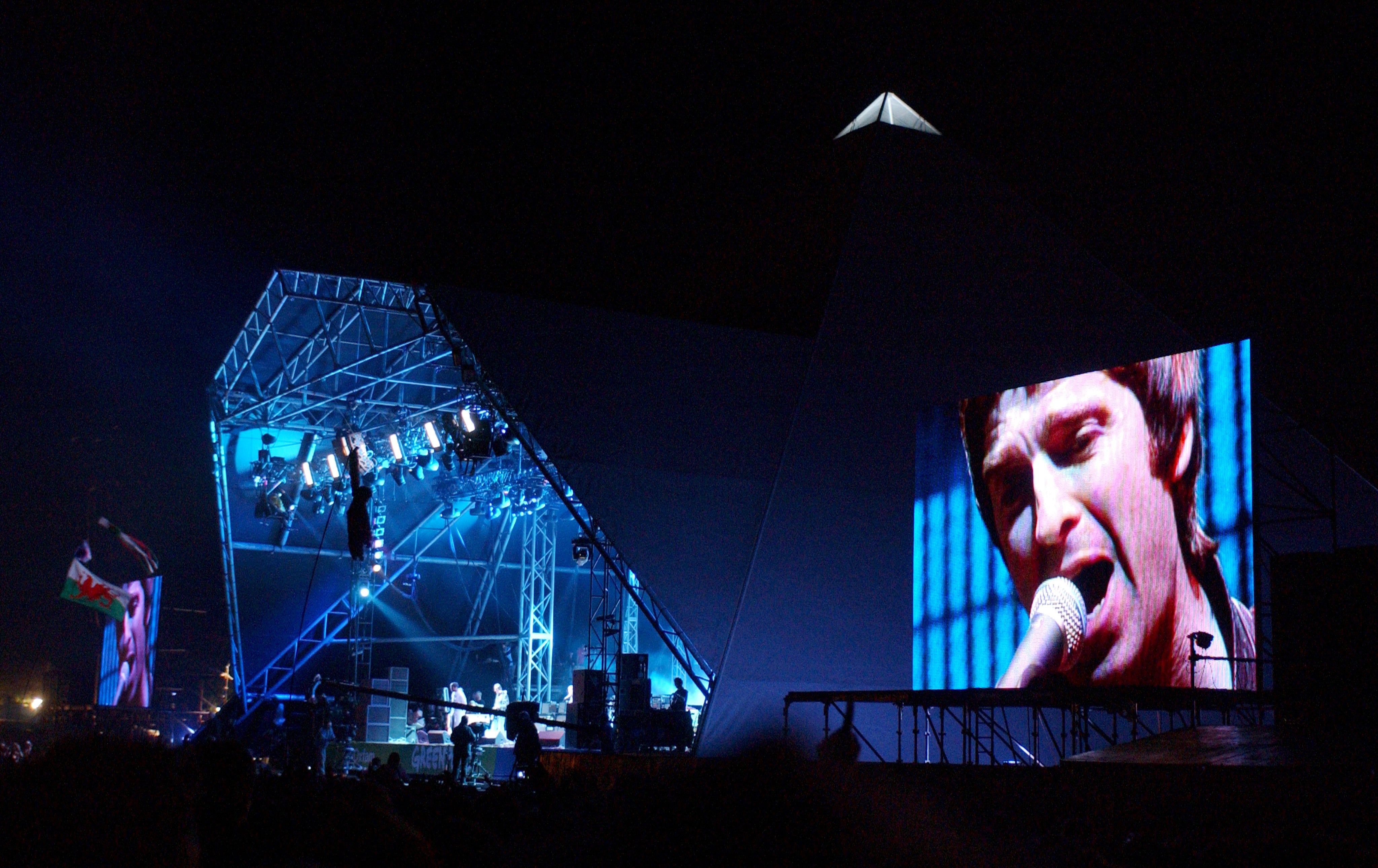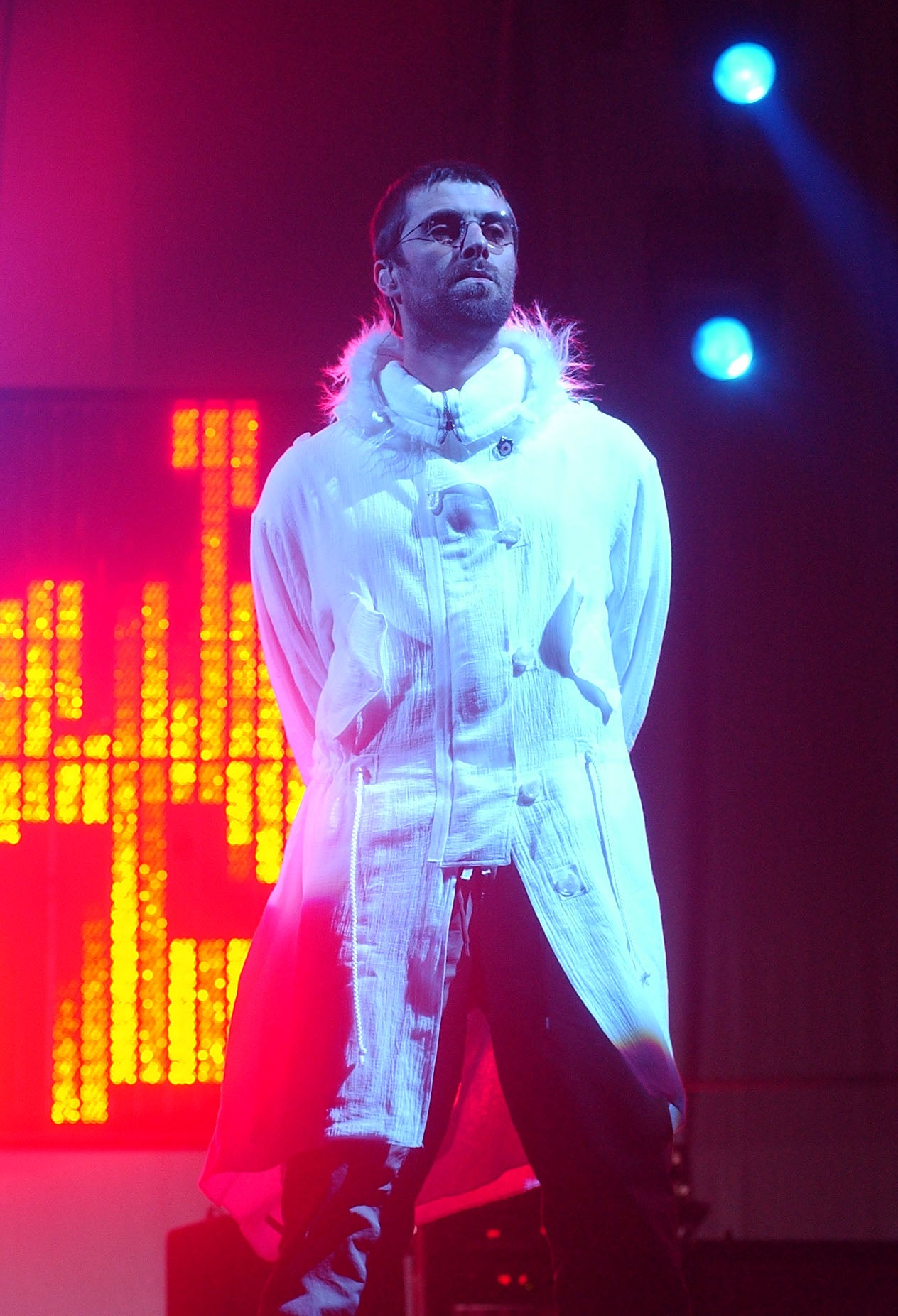Was 2004 the worst Glastonbury ever? If you were an Oasis fan, yes
Twenty years ago, the Manchester band headlined Worthy Farm for the second and last time. Mark Beaumont looks back at the ill-fated show, which has gone down in history as one of their worst, and argues that it marked the beginning of the end for Liam and Noel Gallagher’s Britpop dream

The date is 25 June 2004: Liam Gallagher strides purposefully onto Worthy Farm’s Pyramid Stage with the attitude, determination and blazing white overcoat of a man embarking on an arctic expedition. “Glastonbury,” he addresses the 100,000 people chanting his name, “‘Rock’n’roll Star...’” As the bottled lightning of their trademark opening song was uncorked upon the biggest festival in the world, the stage was set for Oasis to sweep in and steal the decade.
It wouldn’t have been the first time. Ten years earlier, at the same festival just a couple of fields away, Liam had marched onto the NME Stage midway through Sunday afternoon and – alongside Blur and Pulp, who also performed that day – cemented the cultural ascendance of Britpop. The following year, in 1995, he closed the festival’s main stage on Friday night amid scenes of generational triumph. Now, once more headlining the greatest show on earth as millennial Britrock’s elder statesman, Liam had the chance to crown the scene’s biggest success story, cap Oasis’s career, and encase in history the band’s reputation as among the greatest of all time.
Which, sadly, wasn’t quite how it went. Despite the non-existent set design – the band didn’t even shell out for a logo backdrop – “Rock’n’roll Star” made for a customarily dazzling opening. But things quickly went downhill. Come “Bring It on Down”, the crowd, who were enduring yet another mud bath – the sixth in the last seven Glastonburys – found themselves pounded with sludge from the stage, too. The drum intro to “Supersonic” lacked momentum, as if the song was dragging itself through the welly-eating mire. And by “Morning Glory”, Liam’s vocals had grown so flat and slurred, you could feel the ley lines shudder.
Liam’s brother Noel dedicated “Stop Crying Your Heart Out” to the England football team (traditionally out of the Euros on penalties the day before), but even its subtle sentiment couldn’t survive Liam’s bellowing. And by the time he was lounging on the monitors, kicking his tambourine across the stage and phoning in “Champagne Supernova”, the night had gone the way of Rooney’s dreams and the gig was written off as arguably the worst in Oasis’s career.
“Uneventful, lifeless, dull,” the fan boards would read over the coming years. “A nightmare… Oasis at their lowest point… it looked as though the band didn’t want to be there.” Several fans lay the blame for the disaster at the foot of new drummer Zak Starkey, who had replaced the sacked Alan White just six weeks before and was still getting to know the material, often setting a noticeably slower pace than Oasis acolytes were used to. Liam, on the other hand, blamed that old gig-wrecking demon, technology.
“I hated that gig, man,” he told BBC 6 Music’s Matt Everitt in 2019. “I didn’t enjoy that because that was when I’d first started using in-ears [monitors to hear the music] and it spun me out for 15 years… Our kid wanted to go Slash and turn everything up. So, I put them in for the sake of the band and my voice and all that, but I couldn’t get my head round it.”
The monitors, Liam claimed, had erased the connection between fan and band. “You need the interaction,” he said, “you need the vibe, so yeah it was horrible, I didn’t like it. I enjoyed myself after it because you soon put it to bed, you get off your head and all that and I enjoyed the vibe. But the gig, nah, wasn’t for me.”
One attendee made a prescient point when they commented that “it was clear from this gig that Oasis weren’t Oasis anymore”. Admittedly, the Oasis of 2004 were an almost entirely different band from that of Knebworth 1996.

Founding members such as guitarist Paul “Bonehead” Arthurs and bassist Paul “Guigsy” McGuigan had departed, replaced by Heavy Stereo guitarist Gem Archer and Ride’s Andy Bell, respectively, leaving the Gallagher brothers as the sole original members. Watched on the TV or from in the field, Glastonbury 2004 was many casual fans’ first sight of a weightier and more muscular band, prone to overloading their sound and short on major recent hits. Nothing about the show felt as bright and exciting as the Nineties.
Nor, indeed, the 2000s. Conor McNicholas, editor of NME at the time, believes the band scuppered their chance to own the Noughties at that ill-fated show. “Oasis were still the biggest selling act that we had for the cover,” he says. “They cast a very long shadow over the entire scene, and the generation of new bands that were doing the new exciting stuff had all grown up with Oasis. Oasis coming and playing this mega gig and standing astride the entire scene like a colossus, everybody was waiting for this enormous thing that was gonna take place. And it was just not all that. The vibes were off.”

Oasis’s anti-performance attitude, McNicholas argues, clashed with the expectations of a major festival crowd recently enthused by the onstage chaos of The Libertines, the propulsive jitter of The Strokes and The White Stripes, and the showman blitz of The Hives and The Killers. “The scene was really cooking by 2004,” he says. “There was loads of stuff coming through, there was real energy. Once Franz Ferdinand broke through with ‘Take Me Out’, everything changed. Obviously with Oasis there’s very little performance and what was happening between 2002 with The Strokes and The Stripes… live music was back, and people expected a performance, and there wasn’t one. They seemed like a band out of time.”
And place, too. “The thing about Glastonbury is that for it to work you have to meet it on its own terms,” McNicholas says. Take Jay-Z’s groundbreaking 2008 headline set as an example. The hip-hop star opened with a tongue-in-cheek cover of “Wonderwall” in response to Noel’s criticism that rap, and by extension Jay-Z, didn’t belong at the festival.
The world had moved on, and they hadn’t
“It was just jaw-dropping. Instantly this thing is not a Jay-Z gig, it’s Jay-Z at Glastonbury. Oasis didn’t do that at all. They came on and they were just Oasis,” says McNicholas. “Weirdly I don’t think either Liam or Noel gave a s***. They didn’t give an impression that they really cared and I think they felt they were kinda running out of steam.”
Creatively and commercially, though, Oasis still had a way to run. The seven million-selling Don’t Believe the Truth album (2005) gave them two No 1 singles in “Lyla” and “The Importance of Being Idle” and they wouldn’t miss the Top 20 for the rest of their career. Their final album, 2008’s Dig Out Your Soul, marked a critical resurgence for the band and gave them their biggest US chart hit since 1997’s Be Here Now. Their last tour in 2009 included three nights each at Wembley Stadium and Manchester’s Heaton Park. Despite the letdown of Glastonbury 2004, Oasis never crashed and burned.

That set did, though, mark the beginning of the end for the band. It was here their crown slipped, their footing faltered, and in Euros 2004 parlance, they hoofed the zeitgeist way over the bar. The following year Definitely Maybe’s record as the fastest-selling debut album in UK chart history was lost to a bunch of scrappy Sheffield scallywags called Arctic Monkeys. In 2007, that same band would headline Glastonbury’s Pyramid Stage and capture the decade that had slipped through Oasis’s fingers. Here was a band brimming with pace and possibility, in contrast to Oasis who had seemed stuck irretrievably in the mud.
“The world had moved on, and they hadn’t,” McNicholas says. It was all there in the show’s closing moment, as Liam – the man who had made the Nineties so supersonic – stood with his arms folded as his band bludgeoned “My Generation” to a messy, ignominious death.
Having so publicly fumbled rock’s baton into the slurry, neither Liam or Noel has dared headline a Glastonbury stage since, despite Liam topping the Reading and Leeds bill in 2021, and again this year with a full-album show to mark the 30th anniversary of their iconic debut album Definitely Maybe.
Much of the past decade’s relentless Oasis reunion speculation, you suspect, is driven at least partly by fan desire to see the band return to Worthy Farm, make right the errors of 2004, and properly conquer music’s highest peak at last. But maybe, they don’t really want to fly.
Join our commenting forum
Join thought-provoking conversations, follow other Independent readers and see their replies
Comments
Bookmark popover
Removed from bookmarks